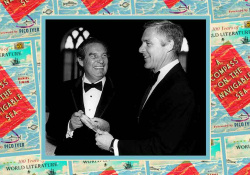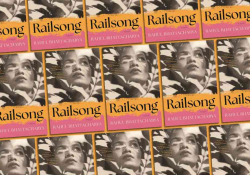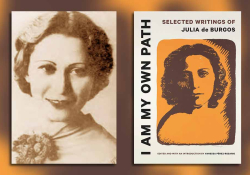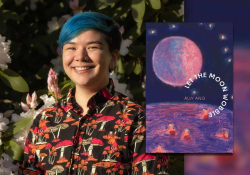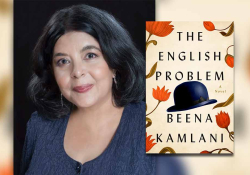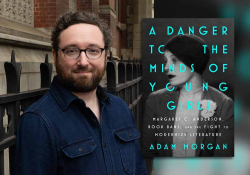Normal People in Love: Sally Rooney’s Ordinary Universal Characters

Sally Rooney’s 2018 novel is a meticulous observation, or even a study, of how one human being can have immense, intense power over another. (The following review contains spoilers.)
The novel Normal People, which was first published in 2018, is the second book of Irish author Sally Rooney. The Guardian referred to her as a “27-year-old novelist defining a generation.” As soon as the book became available, it instantly gained popularity: it was longlisted for the 2018 Man Booker Prize and won the Best Novel category at the 2018 Costa Book Awards. It was also longlisted for the Women’s Prize for Fiction in 2019. A TV series based on the novel will premiere on BBC Three and Hulu on April 29.
The protagonists of the novel, Marianne and Connell, are teenagers who attend the same secondary school in County Sligo, in northwestern Ireland, and later move to Dublin as students at Trinity College. The story is built around their complex, on-off relationship and its development through time. Rooney describes them as “two people who, over the course of several years, apparently could not leave one another alone.”
One could say this book is about formative years—simple coming-of-age or romantic fiction. Technically, that would be right, but also (or more so), we could freely claim that in its essence, the novel is a meticulous observation, or even a study, of how one human being can have immense, intense power over another and how that power is especially weird, disorienting, frightening, and almost impossible to navigate at a young age, at a time when we are simultaneously caught up in the strong web of other powerful influences like ideologies, parents, friends, and society.
We are often taught that feeling incomplete without another person is a sign of weakness, that we should strive for autonomy, pragmatism, personal success, and strength. Our consciousness is soaked in a narcissistic, individualistic way of thinking, but as soon as we face the slightest crisis, our worldview crumbles because we realize how badly we need others and how strongly we are influenced by them. Not only are we not independent, but we are, in fact, dependent on one another for everything, on both a personal and systemic level. Also, we live in times when the logistics of romantic relationships are not supposed to be hard, obsessive, or possessive in any shape or form, so the power that we might feel others have on us—or that we have on them—becomes terrifying. It invades our daily life, disrupts everything that makes us normal, shatters our stability, and may make us feel perverted, ashamed, mental, not like everyone else.
In his book The Art of Loving, sociologist Erich Fromm explores love in the context of contemporary culture, capitalism, and liberalism. He mentions that “our whole culture is based on the appetite for buying, on the idea of a mutually favorable exchange.” He claims that modern man’s happiness “consists in the thrill of looking at the shop windows and in buying all that he can afford to buy. . . . He or she looks at people in a similar way.” Fromm stresses that for men, attractive women—and for women, attractive men—are just “the prizes they are after.” He mentions that the world has become “one great object of our appetite, a big apple, a big bottle, a big breast: we are the sucklers, the eternally expectant ones, the hopeful ones—and the eternally disappointed ones.” He argues that “the mature response to the problem of existence is love,” but love is not just a relationship to a specific person; “it is an attitude, an orientation of character which determines the relatedness of a person to the world as a whole, not toward one ‘object’ of love.” Fromm claims that if love is real, a person cannot love just one other and be indifferent to the rest of their fellow men. In this case, it would be just a primitive, symbiotic attachment or egotism. Fromm concludes that “the main condition for the achievement of love is the overcoming of one’s narcissism.”
Fromm asks a question similar to the one that Rooney seems to be asking: If our culture rewards egotism and narcissism, “how shall we transcend ourselves”? If our culture is alienating, how shall we fully grasp (and have the courage for) intimacy, human closeness, love, and passion in all its shades?
If our culture is alienating, how shall we fully grasp (and have the courage for) intimacy, human closeness, love, and passion in all its shades?
While reading the novel, I feel like the author randomly “zooms into” the lives of ordinary, normal people. Through exploring this concrete couple’s lives, through observing the beauty and difficulties of their relationship and how external powers influence them, the novel asks a simple but also infinitely hard question: How could people be together and love one another in our times?
Marianne and Cornell’s relationship persists through the years but takes many different forms. In school, due to fear of losing popularity and being disapproved of, Cornell is embarrassed to tell his friends about Marianne. She is considered a loner, an outsider, and Cornell seems to be extremely sensitive to what other people think of him and, therefore, terrified of judgment. Marianne, on the other hand, is much more mature—although, like everyone, she is bothered by other people’s perceptions, she is not completely defined and paralyzed by it. It seems like her defense mechanism is to instantly reject people who reject her, but as a young woman, she is even more despised because of it. The general expectation of society is for a woman to want to please others. A young woman who seems to be rebelling against societal norms is unnatural, almost threatening. Even her mother believes that Marianne “lacks ‘warmth,’ by which she means the ability to beg for love from people who hate her.”
As Cornell and Marianne continue to meet in secret, their relationship deepens. Marianne seems quite understanding, even wise, about Cornell’s low self-esteem and fear of “confessing” to his friends, but the situation becomes more complex as they naturally reach the point where hiding feels absurd and Cornell has to choose something concrete. Even if Cornell likes meeting Marianne in secret and seems to be falling in love with her, even if being alone with her feels like “opening a door away from normal life and then closing it behind him,” even if their relationship reaches the point of absolute trust and a “desire for total communication, a sense that anything unsaid is an unwelcome interruption between them,” the fear of social disapproval still overweighs his feelings. After telling Marianne he loves her right before the Debs (prom night), he still gets scared at the last moment and invites a popular girl among his friend group instead of Marianne. But the reason Cornell is scared is not only his friends’ judgment but also a general fear of being truly close to someone, letting someone know you, feeling power over someone, and letting them have power over you. His attraction for her feels as terrifying as “an oncoming train,” so in panic, “he throws her under it.”
Later, they meet at Trinity College, away from their hometown, as students, after not having spoken to each other since summer. Their roles are almost reversed: in the context of the elitist university, social class starts to play a huge role and determines their group of friends. Marianne comes from an upper-middle-class family, so she fits in quite easily, unlike Cornell. Even if Marianne could simply ignore him and act like she does not even know him (exactly like Cornell behaved with her in school), she helps him make friends and overcome his social anxiety instead.
Even during their college years, Cornell is never fully freed from fearing his own feelings and the power he has over Marianne. Every time they reach the point of stability, Cornell seems to sabotage it. Even if Marianne gets tremendously hurt every time, she still goes along with him, so their relationship becomes very fluid. They go from living together as a couple to being friends and having relationships with other people and back again, in short periods of time. The only thing that stays constant is their desire to stay in touch, to be part of each other’s lives.
In relationships with other people, both of them seem to struggle—they are unable to reach the same intensity of feelings for other people as with each other. Marianne seems to be much more aware that no one has as much power over her as Cornell. Therefore, she struggles even more than he does. By the end of their studies, when they seem to be closer and more secure in their relationship than ever, Cornell tells Marianne about being admitted to a creative writing program in New York and being unsure about going if she can’t follow him.
Despite the fact that Cornell is essential to Marianne and his every touch, every look, has tremendous power over her, in spite of feeling fully happy and complete beside him and spending Christmases with him, finally finding refuge in his home while hers is crumbling, in spite of him being the only person she can call in the most difficult times, through enormous pain, in the end, she still lets him go. She tames her anger and desire for him to stay and respects his wish, accepts what is best for him, not for her. I can’t think of a purer manifestation of love. And what more can one damaged, flawed, and imperfect human possibly do for another? What could be more egoless, more beautiful? And how stunning is it that we humans have this capacity? How mind-blowingly surreal and, at the same time, ordinary it is. “You should go. I’ll always be here. You know that,” she says, and this line should be interpreted not as a touching statement but as a deluded promise to a lover at a moment of parting. It is not even something she chooses to do for him, but it is something she simply can’t control, something she states as a pure fact, something that she has absolutely no control over—because it’s just how it is. She will always care for him. She will always be there for him, as simple as that.
What more can one damaged, flawed, and imperfect human possibly do for another?
What kind of people would they have been if they had not been together? If they had never known each other, what kind of lives would they have led? Would Cornell have even discovered his passion for writing if Marianne had not encouraged him to apply for English while they were still in school, instead of studying law? Would he ever have dared to believe in his talent if Marianne had not seen it and believed in him first? Would Marianne have ever broken out of her toxic family and believed that she could, in fact, be loved by another person? They both wonder a lot about this. “He would be somewhere else entirely, living a different kind of life. He would be different with women even, and his aspirations for love would be different,” Marianne thinks. But then again, she would also have been another person completely. “All these years they’ve been like two little plants sharing the same plot of soil, growing around one another, contorting to make room, taking certain unlikely positions. But in the end she has done something for him, she’s made a new life possible, and she can always feel good about that.”
Marianne seems to be submitting to the realities of human relationships and closeness: its beauty and richness, its transforming power, the strangeness of feeling “completely under the control of another person,” the unavoidable messiness and pain. As she once mentioned, “You are not really submitting to someone if you only submit to the things you enjoy.” Marianne feels that “no one can be independent of other people completely,” so maybe it’s better to just give up the attempt altogether, “go running in the other direction, depend on people for everything, allow them to depend on you, why not.” Her openness, wisdom even, enables her to fully experience all shades of love for Cornell, to be able to forgive him over and over again, to make their relationship deeper, and, eventually, to let him go. After all, “most people go through their whole lives, without ever really feeling that close with anyone.”
An important aspect worth mentioning, other than the idea of the novel, is the language in which the story is narrated. It is very easy to read but, at the same time, peculiar and detailed, so you almost get the feeling that there is absolutely no filter, no barrier between you (the reader) and the text. All the feelings and intimate moments described in the book hit you as a pure, raw emotion, as if you were observing the protagonist in real life or as if you were even fully them. This lack of filter gives the reader an experience of “losing yourself in the book” completely.
Also, the author is challenging contemporary forms of literature, “intellectual snobbery,” and the stereotypes that most people seem to have about books. Rooney’s novels are some of the best examples that show that easy-to-read books are not necessarily banal and that even if a novel is completely about banal experiences, the most common, most ordinary events and feelings, it does not make the story itself primitive. Banal experiences very often serve as the ideal gateway to universal experiences, and we can observe this in Rooney’s book very clearly.
The novelist James Baldwin, when speaking about literature and its purposes, contends: “You think your pain and your heartbreak are unprecedented in the history of the world, but then you read. It was books that taught me that the things that tormented me most were the very things that connected me with all the people who were alive, who had ever been alive.” I believe Rooney is masterful at connecting the reader to something bigger than them, something universal, through stories about ordinary human experience and encounters.
IPU Berlin


